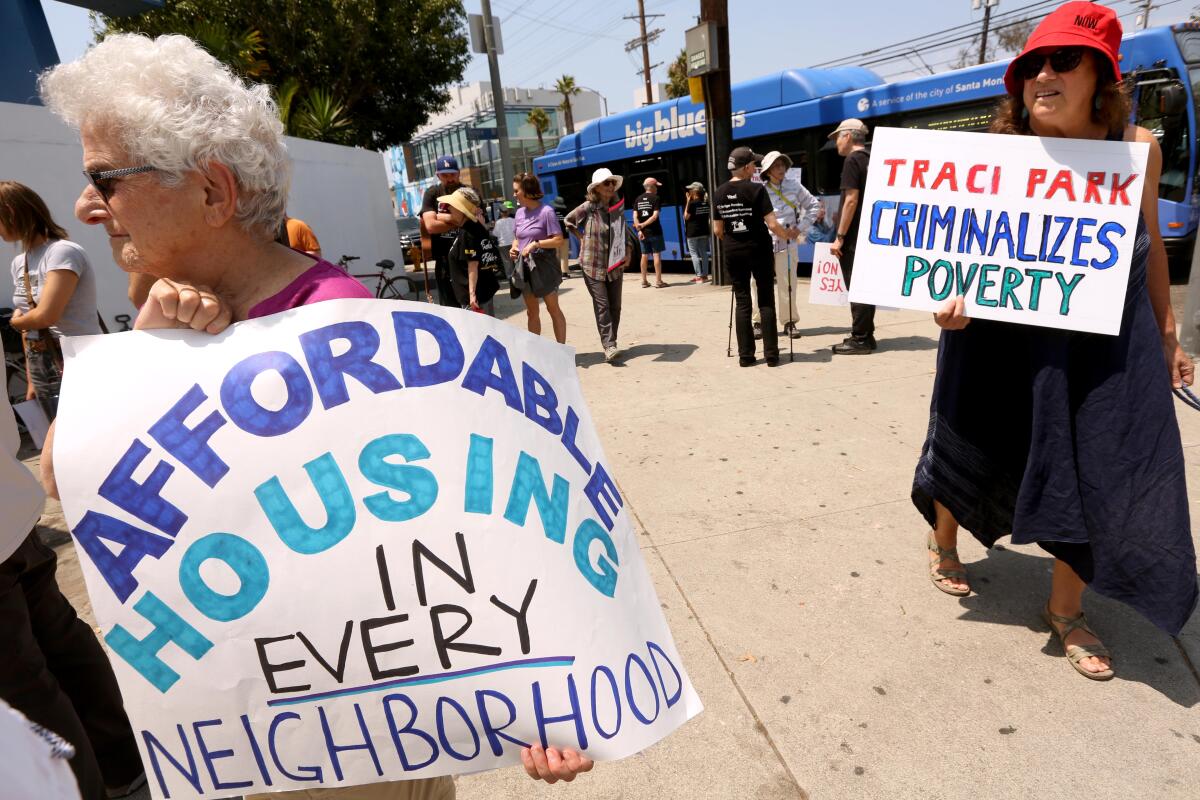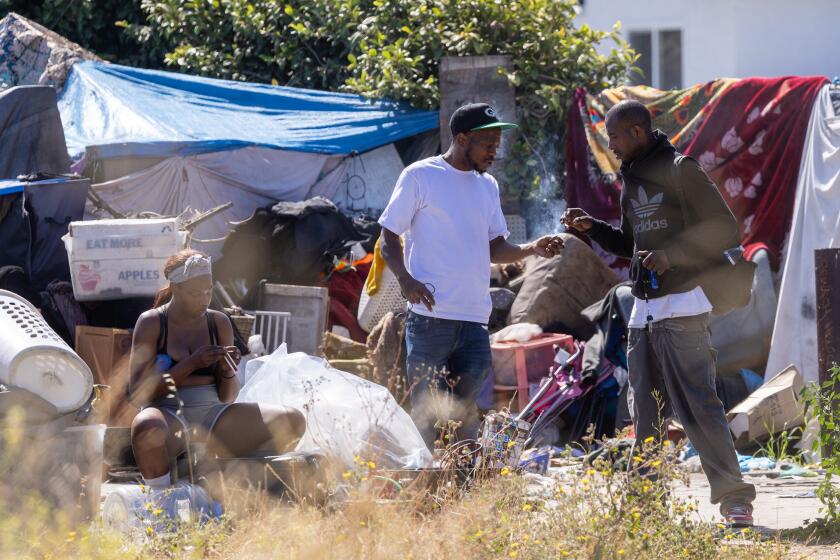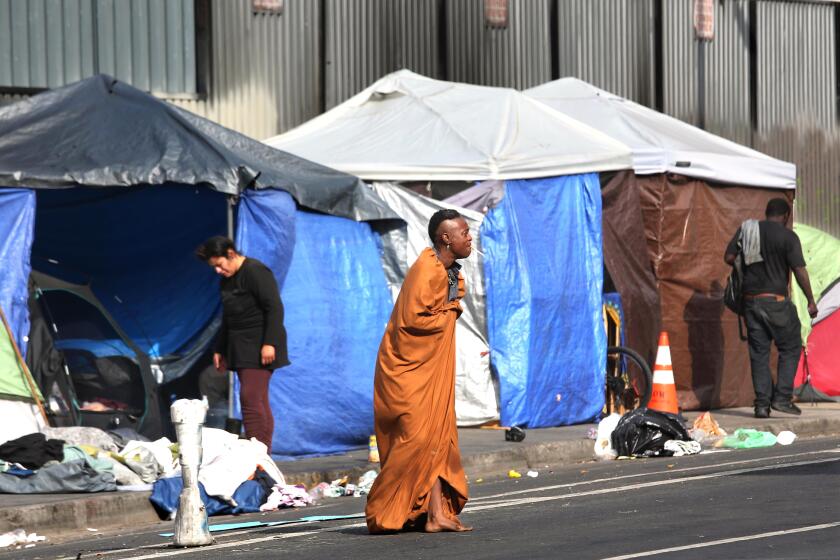Human Rights Watch slams L.A. and state for criminalizing homelessness

- Share via
Human Rights Watch issued a voluminous report Wednesday castigating local officials and Gov. Gavin Newsom for criminalizing homelessness and failing to observe “an internationally protected human right” to “adequate housing.”
The organization, which reports on human rights abuses in some of the most violent places on earth, said the U.S. as a whole, and particularly the City of Los Angeles, have treated “housing primarily as a commodity” while “their primary response on the ground has been criminalization of those without it.”
The 310-page report, “ ‘You Have to Move!’ The Cruel and Ineffective Criminalization of Unhoused People in Los Angeles,” consists of dozens of case studies, charts and graphics of arrest and camp cleanup data and extended passages of social commentary. It recounts the history of litigation over homelessness and major enforcement actions from Echo Park to Venice.
“Criminalization effectively destroys lives and property based on race and economic class,” it says. “It is a set of policies that prioritizes the needs and values of the wealthy, property owners, and business elites, at the expense of the rights of people living in poverty to an adequate standard of living.”
It traces the homelessness crisis to decades of national “austerity policies, including dramatic cuts to social safety nets over the past several decades, abandonment of funding for public housing, and removal of regulations that favored affordable housing development and preservation.”
But the bulk of the report zeroes in on the city of Los Angeles.
In a detailed analysis of arrest records obtained through the Public Records Act, Human Rights Watch found that homeless people, while only about 1% of the city’s population, accounted for 38% of all citations and arrests from 2016 to 2022, and 17% of all people booked into jail upon arrest.
That included 20% of all felony arrests, 42.6% of all misdemeanor arrests and more than 99% percent of infraction arrests.
“An unhoused person in Los Angeles was 79 times more likely than a housed person to receive a citation or arrest and 27 times more likely to be booked into jail,” it said.
L.A. County supervisors are set to take up a motion reaffirming their policy against criminalizing homelessness, the latest response to a Supreme Court ruling on anticamping laws.
The report credits Mayor Karen Bass for seeking a new approach but concludes that her signature Inside Safe program has fallen short.
Inside Safe has “prioritized publicly visible encampments as opposed to setting aside rooms for people with the most need,” it says. “This prioritization appears to be driven by City Council office preferences and complaints from housed neighbors, rather than helping the most vulnerable.”
The report faults the Los Angeles Homeless Services Authority, which it said has “given in to demands by city officials, particularly in City Council offices, to actively participate in destructive sanitation sweeps, upending the process of trust and rapport building.”
In a statement released Wednesday, Bass’ office slammed what it called a “cynical and disingenuous report” that relies on data before she took office and “wants to take us backwards to a time where people sit around pontificating about policy changes while Black and Brown people languish and die on 100 degree sidewalks and homelessness explodes in our City.”
“Unhoused Angelenos, businesses, schools and neighborhoods impacted by encampments need relief today — that’s why we’re implementing urgent strategies that have led to homelessness decreasing for the first time in years.”
LAHSA issued a statement saying that it participates in programs as directed by the city and county, which fund the joint powers authority.
“Over the last couple of years, our staff have observed LAPD’s role in the clean-ups to be limited,” it said. “If LAHSA were not present, there would not be any professional staff trained in trauma-informed care whose purpose is to help people experiencing homelessness and advocate with the clean-up crew on their behalf.”
The report also criticizes Newsom’s mental health initiatives that provide a court process for family members to seek treatment for a person with mental illness and expand the criteria for conservatorship to include people who are unable to provide for their own safety or medical care, including substance use treatment.
“People who fail to comply with court-ordered treatment can be fast-tracked to conservatorships” that have been “particularly threatening to unhoused people, who are continually being policed and are likely to be a major target.”
Gov. Gavin Newsom issues an executive order requiring state agencies to remove homeless encampments in their jurisdictions and urging California’s cities to follow suit.
Newsom’s office responded with a statement saying the suggestion that CARE Court and conservatorship reform “threaten individuals is a blatant misrepresentation.”
Rather, they are “compassionate, necessary responses to the crisis on our streets and at home, providing vital mental health and substance use services proven to save lives, break cycles of suffering, homelessness, and incarceration, and support our loved ones living with the most serious mental illnesses and severe substance use disorders,” it said.
Based on research conducted from April 2021 through March 2024, the report mentioned only in passing the U.S. Supreme Court ruling in June allowing the citation or arrest of people for camping in public places.
In an email, principal author John Raphling, senior researcher for Human Rights Watch’s U.S. program, said that ruling and Newsom’s subsequent executive order urging cities to remove encampments “threaten to worsen the crisis and cruel treatment.”
The report reiterates standard truisms of homelessness — that housing is the only effective way to end it, for one — with an activist tone reflected in an explication of its preference for “unhoused” instead of “homeless” as the more accurate term. “Homeless,” it argues, implies that a person does not belong and should be “removed from sight,” while “unhoused” recognizes their right to exist in their community and their human right to housing.
“Criminalization,” it says, “is grounded in an ideological belief that individual ‘pathologies’ or perceived moral failings as opposed to large-scale economic conditions, cause houselessness.”
The report adds a dimension to its conclusions by placing homelessness in the context of international principles.
Criminalization, it says, violates prohibitions against cruel, inhuman or degrading treatment in two treaties ratified by the United States, the International Covenant on Civil and Political Rights and the Convention Against Torture and Other Cruel, Inhuman or Degrading Treatment or Punishment.
It cites two other treaties that recognize the right to adequate housing, the Universal Declaration of Human Rights and the International Covenant on Economic, Social and Cultural Rights, which the U.S. has signed but not ratified.
The report gives credit to cleanups conducted by the Los Angeles Bureau of Sanitation that are primarily designed to remove waste and hazardous materials.
“However, a substantial portion of LASAN cleanups amount to wholesale destruction of encampments, confiscation of property, and destruction of property, including clothing, bedding, tents, medications, personal papers, family mementos, and other personal items,” it says.
The report concludes that Los Angeles city and county governments, the state of California and the U.S. government should “affirm a right to adequate housing as defined under international human rights law and invest sufficient funds to progressively realize this right.”
“Most immediately, to help slow the spread of houselessness, the city and state should find ways to protect existing tenancies and prevent evictions, while also protecting others’ rights.”
It also recommends a basic income program for extremely poor residents and voluntary, community based mental health care for all people.
More to Read
Sign up for Essential California
The most important California stories and recommendations in your inbox every morning.
You may occasionally receive promotional content from the Los Angeles Times.













